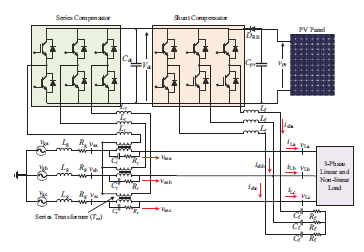Design and Control of PV-UPQC Using Variable Leaky LMS Based Algorithm for Power Quality Enhancement
Objective
The Main Objective of this Project is to improve the Power quality of the system using PV-UPQC
Abstract
The proposed work deals with the multiple power quality (PQ) issues by the proper operation and effective control of photovoltaic (PV) fed unified power quality conditioner (UPQC) by using soft computing technique. Variable leaky least mean square (VLLMS) algorithm is neural network based soft computing technique which provides faster convergence rate without drifting the weight parameter beyond the limit. Here, extraction process of fundamental component for both series and shunt compensators of the UPQC is based on VLLMS algorithm. In this method extraction of reference signals for switching of voltage source converters (VSC) of series and shunt compensators is carried out by updating the weights in an iterative manner. The shunt compensator maintains DC link voltage, compensates reactive power demand of load and mitigates harmonics in the current due to the involvement of non-linear load. The series compensator maintains the voltage level at the load terminal and eliminates distortions in voltage waveform due to sag/swell
and harmonics. The functionality of the proposed system is investigated by using MATLAB/Simulink.
Keywords: Power quality, PV, series compensator, shunt compensator, soft computing, UPQC, VLLMS.
NOTE: Without the concern of our team, please don't submit to the college. This Abstract varies based on student requirements.
Block Diagram

Specifications
Software Configuration:
Operating System : Windows 7/8/10
Application Software : Matlab/Simulink
Hardware Configuration:
RAM : 8 GB
Processor : I3 / I5(Mostly prefer)
Learning Outcomes
- Introduction to Matlab/Simulink
- What is EISPACK & LINPACK
- How to start with MATLAB
- About Matlab language
- About tools & libraries
- Application of Matlab/Simulink
- About Matlab desktop
- Features of Matlab/Simulink
- Basics on Matlab/Simulink
- Introduction to controllers.
- Study of PWM techniques.
- Project Development Skills:
- Problem analyzing skills
- Problem solving skills
- Creativity and imaginary skills
- Programming skills
- Deployment
- Testing skills
- Debugging skills
- Project presentation skills
- Thesis writing skills


 Paper Publishing
Paper Publishing
